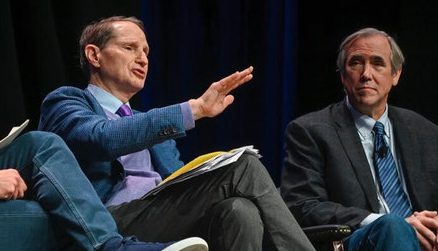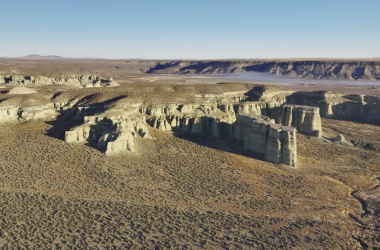The moment for U.S. Sen. Ron Wyden came after a decade of politics and patience, seasoned with science.
The U.S. Senate on a Sunday afternoon in early August passed what has been described as the country’s largest investment in efficient energy.
Wyden had nursed along his Clean Energy for America Act for years and now it was law, part of the massive Inflation Reduction Act.
As he stepped off the Senate floor on Aug. 7, one of the first to congratulate him about the accomplishment was President Joe Biden, who reached Wyden on his cell phone.
“He was just so gracious, so appreciative,” Wyden said in a recent interview. “He knows that the real key in the Senate is persistence, being straight with people and having the facts.”
The energy legislation relies primarily on tax credits for both business and consumers who invest in everything from retrofitting factories to upgrading home appliances.
“This is the biggest investment in climate change in American history,” Wyden said.
“Nobody knows what are going to be the carbon emission reducers 10 years from now.”
–U.S. Sen. Ron Wyden
The path to passage shows how the inner mechanics of Congress, and particularly the Senate, can still result in action. Most public attention in the modern era is focused on the bitter divisions between Democrats and Republicans in both the Senate and the House.
But it was Democrats who doomed early work on climate change legislation.
Senate sits on legislation
In 2009, the House passed the American Clean Energy and Security Act, considered the leading climate legislation. But the bill went to the Senate and died from inattention.
Wyden, who started serving in the Senate in 1996, said the legislation struck conservative and moderate senators as too punitive – “too heavy a hand.”
From his seat on the Senate Energy and Natural Resources Committee, Wyden thought the only chance forward for meaningful energy legislation was to “drop the sticks and hammering on people.”
Wyden assessed it was going to take a new political coalition to press climate change legislation. That required a reliance on respected science about climate and energy. But it also required changing from focusing on specific technology, which in the past meant some industries were favored with federal benefits and others weren’t.
Instead, Wyden said, federal policy had to be “technology neutral.” The intent was to reward any business or consumer who reduced carbon emissions. How they did it would be less important.
The notion appealed to Wyden because it supported invention.
Pushing invention
“Nobody knows what are going to be the carbon emission reducers 10 years from now,” Wyden said.
In 2012, Wyden got an invitation from someone who would a decade later be crucial to passage of the Clean Energy for America Act – Sen. Joe Manchin, Democrat from West Virginia.
That resulted in a tour of coal mines, wind farms and hydroelectric plants over a summer weekend.
Wyden provided a gracious statement for Manchin’s news release after the tour.
“I did not see anyone in West Virginia over the last two days that wanted to pillage and ravage their wonderful land, air and water,” Wyden said.
But the tour also gave Wyden time to kick around energy policy with Manchin.
“That’s when I started talking to him about how do we try to find a way to bring people together” about ways to reduce carbon emissions, Wyden said. “What do you think it’s going to take to break the ice here?”
A first try
By 2015, Wyden was ready and introduced the first version of his Clean Energy for America Act. Progress stalled until the election of Biden, an advocate of climate change measures. Wyden said he saw his chance as the Biden administration settled in at the start of 2021.
“In public service, if you work hard and you prepare, keep your eyes open, look for an opportunity, you can succeed,” Wyden said.
With Democrats in control of the House and an evenly-divided Senate, Wyden pushed ahead on climate change legislation.
“I said to my colleagues, ‘This is the time.’ They agreed,” he said.
He said “more than a decade of sweat equity” paid off as the Senate Finance Committee he chairs held hearings of the legislation and advanced the bill in May.
Opening to advance
“The American people know the climate crisis is an existential threat and strongly support bold action,” Wyden said in a statement after the vote.
The proposal was rolled into the Inflation Reduction Act, which seemed on track to Senate approval and enactment.
Then, “It looked like the whole thing was going to collapse. ‘We’re not giving up,’ I kept telling everybody. We will never have a better shot at it.”
Manchin, a key vote for Democrats in the tied Senate, stunned his colleagues, telling them on July 14 that he couldn’t support the larger package. Two weeks of negotiating by Senate leaders followed, and Manchin became a “yes” vote. The final vote included about 90% of the 2021 version of Clean Energy for America Act.
“The roller coast ride was not for the faint of heart,” Wyden said.
Contact Editor Les Zaitz: [email protected]
EXCELLENCE IN JOURNALISM – Available for $7.50 a month. Subscribe to the digital service of the Enterprise and get the very best in local journalism. We report with care, attention to accuracy, and an unwavering devotion to fairness. Get the kind of news you’ve been looking for – day in and day out from the Enterprise.




